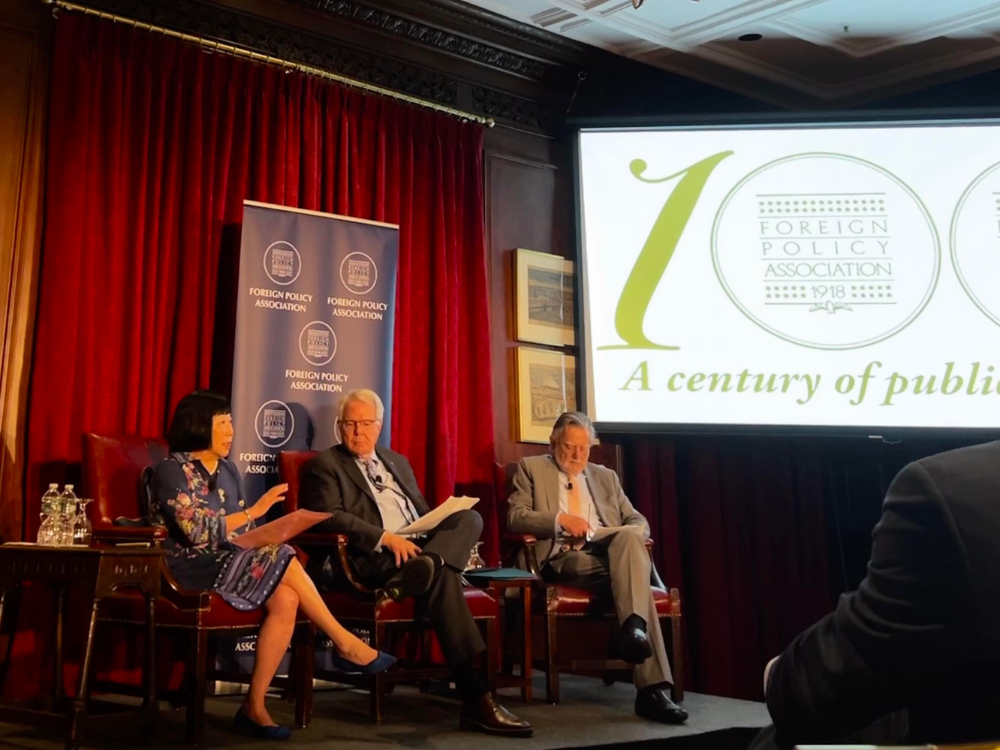
“As we all know, we are going through some of the most challenging times in the history of US-China relations. The era of engagement with China has come to a definitive close, but can we compete without bringing on catastrophe?”
On Tuesday, May 31, Ambassador Julia Chang Bloch, USCET Executive Chair, moderated the Inaugural Dame Jillian Sackler Symposium on U.S.-China Relations. The conference, titled “US-China Relations: Taking Stock and Looking Ahead,” was hosted by the Foreign Policy Association at the Harvard Club of New York. The recording, which you can find here, has amassed over 10,000 views.
The panel featured distinguished China experts Dr. David M. Lampton, Professor Emeritus of China Studies at the Johns Hopkins School of Advanced International Studies, Dr. Paul G. Clifford, a Nonresident Senior Fellow at the Harvard Kennedy School, and Career Ambassador J. Stapleton Roy, the fifth U.S. ambassador to China.
In her introductory remarks, Ambassador Bloch noted the timeliness of the Symposium in the wake of a flurry of Asia-focused diplomatic initiatives from the Biden administration just in the month of May. The White House hosted a Special Summit with the Association of Southeast Asian Nations, followed by President Biden’s first presidential trip to Asia, where he launched a new Indo-Pacific Economic Framework with 13 inaugural members.
Ambassador Bloch posed questions to the speakers concerning Secretary of State Anthony Blinken’s topical speech unveiling the Biden administration’s China policy and the implications of Russia’s invasion of Ukraine with China’s tacit support on Sino-American relations as well as on global nuclear security. The panelists also discussed potential conflict over Taiwan and Biden’s recent comments that the United States would defend Taiwan in the event of an invasion.
“We are sleepwalking into a potential high level of conflict with China,” Dr. Lampton explained in his opening statement. He highlighted the remarkable parallel between Blinken’s speech and NSC-68, which were secret papers drafted by the National Security Council in 1950 that laid the groundwork for President Truman’s waging of the Cold War—suggesting that U.S.-China relations may be heading in the same direction.
Dr. Clifford discussed some of the major developments that have shaped U.S.-China relations in the past decade, focusing particularly on technology. For example, advancements in artificial intelligence and public surveillance have increased the Chinese Party’s mechanisms for repression, which in turn, has strengthened bipartisan support in the United States for a more hardline stance against China. Accordingly, both powers are moving away from soft power approaches, Dr. Clifford notes.
Ambassador Roy spoke about the lessons to be learned from Russia’s invasion of Ukraine, noting the consequences of crossing “red lines.” “We can support Taiwan but we cannot defend it,” Ambassador Roy said, noting the dangers of war between two nuclear-armed powers and calling for greater caution within the Biden administration to recognize China’s longstanding stance on Taiwan. The panelists agreed that if the U.S. were to be involved in a conflict over Taiwan, the result would be catastrophic.
As the panelists took stock of the state of U.S.-China relations since rapprochement 50 years ago, they conveyed a pessimistic outlook for the future of the relationship, though each described spheres in which cooperation—or at the very least, compromise—between the two great powers is still possible, and arguably necessary.
